

Machine learning pipelines. J'arrive pas à dormir, donc : Un like = un fait peu reluisant ou une unpopular opinion à propos de l'intelligence artificielle. Unleashing the power of AI for education. Unleashing the power of AI for education. Artificial intelligence (AI) is a major influence on the state of education today, and the implications are huge.

AI has the potential to transform how our education system operates, heighten the competitiveness of institutions, and empower teachers and learners of all abilities. The opportunities for AI to support education are so broad that recently Microsoft commissioned research on this topic from IDC to understand where the company can help. The findings illustrate the strategic nature of AI in education and highlight the need for technologies and skills to make the promise of AI a reality. The results showed almost universal acceptance among educators that AI is important for their future—99.4% said AI would be instrumental to their institution’s competitiveness within the next three years, with 15% calling it a “game-changer.”
A hybrid AI model lets it reason about the world’s physics like a child. A new data set reveals just how bad AI is at reasoning—and suggests that a new hybrid approach might be the best way forward.
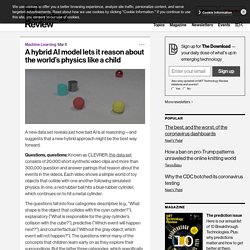
Questions, questions: Known as CLEVRER, the data set consists of 20,000 short synthetic video clips and more than 300,000 question and answer pairings that reason about the events in the videos. Each video shows a simple world of toy objects that collide with one another following simulated physics. In one, a red rubber ball hits a blue rubber cylinder, which continues on to hit a metal cylinder. The questions fall into four categories: descriptive (e.g., “What shape is the object that collides with the cyan cylinder?”) What AI still can’t do. In less than a decade, computers have become extremely good at diagnosing diseases, translating languages, and transcribing speech.
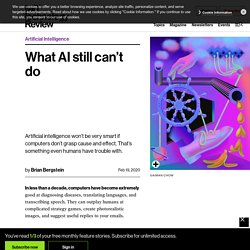
They can outplay humans at complicated strategy games, create photorealistic images, and suggest useful replies to your emails. Yet despite these impressive achievements, artificial intelligence has glaring weaknesses. Machine-learning systems can be duped or confounded by situations they haven’t seen before. Possibleminds pinker. Scientists Create an AI From a Sheet of Glass. AI Glass It turns out that you don’t need a computer to create an artificial intelligence.
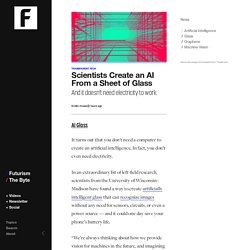
In fact, you don’t even need electricity. In an extraordinary bit of left-field research, scientists from the University of Wisconsin–Madison have found a way to create artificially intelligent glass that can recognize images without any need for sensors, circuits, or even a power source — and it could one day save your phone’s battery life. “We’re always thinking about how we provide vision for machines in the future, and imagining application specific, mission-driven technologies,” researcher Zongfu Yu said in a press release. “This changes almost everything about how we design machine vision.” Numbers Game. What Boards Need to Know About AI. Who needs Copernicus if you have machine learning? The laws of physics, among the greatest discoveries of humankind, have emerged over many centuries in a process often influenced by the prominent thinkers of the time.
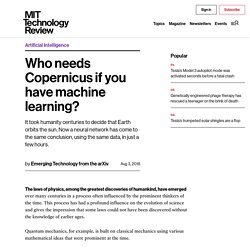
This process has had a profound influence on the evolution of science and gives the impression that some laws could not have been discovered without the knowledge of earlier ages. Quantum mechanics, for example, is built on classical mechanics using various mathematical ideas that were prominent at the time. But perhaps there is another way of discovering the laws of physics that does not depend on the understanding we have already gained about the universe. Today Raban Iten, Tony Metger, and colleagues at ETH Zurich in Switzerland say they have developed just such a method and used it to discover laws of physics in an entirely novel way. The Seven Deadly Sins of AI Predictions. We are surrounded by hysteria about the future of artificial intelligence and robotics—hysteria about how powerful they will become, how quickly, and what they will do to jobs.
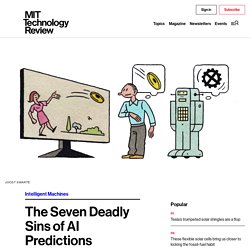
I recently saw a story in MarketWatch that said robots will take half of today’s jobs in 10 to 20 years. It even had a graphic to prove the numbers. The claims are ludicrous. (I try to maintain professional language, but sometimes …) For instance, the story appears to say that we will go from one million grounds and maintenance workers in the U.S. to only 50,000 in 10 to 20 years, because robots will take over those jobs.
Five questions you can use to cut through AI hype. Two weeks ago, the United Arab Emirates hosted Ai Everything, its first major AI conference and one of the largest AI applications conferences in the world.
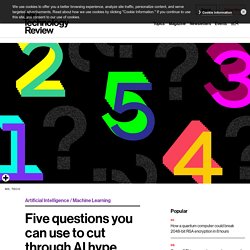
The event was an impressive testament to the breadth of industries in which companies are now using machine learning. It also served as an important reminder of how the business world can obfuscate and oversell the technology’s abilities. In response, I’d like to briefly outline the five questions I typically use to assess the quality and validity of a company’s technology: 1. Here's the 8 types of Artificial Intelligence, and what you should know about them. Artificial intelligence (AI) is a broadly-used term, akin to the word manufacturing, which can cover the production of cars, cupcakes or computers.
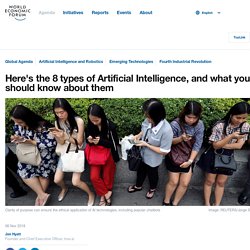
Its use as a blanket term disguises how important it is to be clear about AI’s purpose. Purpose impacts the choice of technology, how it is measured and the ethics of its application. Here's the 8 types of Artificial Intelligence, and what you should know about them. A radical new neural network design could overcome big challenges in AI. David Duvenaud was collaborating on a project involving medical data when he ran up against a major shortcoming in AI.
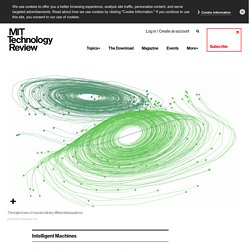
An AI researcher at the University of Toronto, he wanted to build a deep-learning model that would predict a patient’s health over time. The Seven Deadly Sins of AI Predictions. Learning Problems for Neural Networks Practice Problems Online. DIVERS ASPECTS DE LA PENSEE CONTEMPORAINE du dimanche 07 octobre 2018. Avec nos partenaires, nous traitons vos données pour les finalités suivantes : le fonctionnement du site, la mesure d'audience et web analyse, la personnalisation, la publicité et le ciblage, les publicités et contenus personnalisés, la mesure de performance des publicités et du contenu, le développement de produit, l'activation des fonctionnalités des réseaux sociaux.
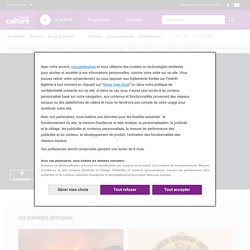
Vos préférences seront conservées pendant une durée de 6 mois.
3 Questions About AI That Nontechnical Employees Should Be Able to Answer. Executive Summary There are three important questions that any member of your team should be able to answer about AI: How does artificial intelligence work? RevancheNeurones Reseaux. Géopolitique de l’Intelligence artificielle. Géopolitique de l’Intelligence artificielle. Europe is determined to break the US and Chinas artificial intelligence duopoly. The United States and China currently dominate the world of artificial intelligence, but used very different approaches to get there. While the US’s academic system has generated and incubated the research that made today’s AI possible, China’s government has pledged billions in funding and offered the technology its full-throated support. It’s a space-race redux, where world superpowers battle to define generations of technology to come. Unlike space, there’s no clear finish line.
Despite the duopoly narrative, other countries, including Canada and the UK, have ramped investment in the technology, announcing deals to fund private and public AI ventures. Do You Trust This Computer? Here's the AI documentary Elon Musk thinks is essential viewing. Forgive me for saying it at the beginning of a tech article, but Elon Musk is a massive hipster in that if he's really into something, he's going to broadcast it.
And it's absolutely going to catch on with the rest of the world. On his Twitter account on Thursday evening, he blasted a documentary he is both in and thinks is accurate. Want to watch it? Click here. The documentary - Do you trust this computer - is particularly relevant given Facebook's ongoing Cambridge Analytica scandal. AI Is About to Drastically Change. In Brief A new theory pushes people to "think outside the brain" when it comes to AI. The tech might not need to be associated with the brain at all — perhaps, instead, the cell. Artificial Intelligence Artificial intelligence (AI) and its corresponding technology all hinge on our human understanding of what intelligence is.
Intelligence artificielle : ce qu’il faut retenir du rapport de Cédric Villani. Le mathématicien et député LRM s’est vu confier la réalisation d’un rapport sur l’IA. Recherche, environnement, défense, éthique… le point sur ses recommandations. Le député La République en marche (LRM) de l’Essonne Cédric Villani, mathématicien lauréat de la prestigieuse médaille Fields, a rendu, mercredi 28 mars, son rapport sur l’intelligence artificielle (IA), commandé par le gouvernement en septembre. Alors qu’Emmanuel Macron s’apprête à annoncer, jeudi, la stratégie de la France dans ce domaine, retour sur les principales conclusions de ce rapport. A Hippocratic Oath for artificial intelligence practitioners – TechCrunch.
Building AI systems that work is still hard. The questions about AI that we should be asking. AI Beats Humans at Reading Comprehension, but It Still Doesn’t Truly Comprehend Language. Keeping tabs on millions of shipping containers is difficult. But IBM and A.P. Moller-Maersk, the world’s largest container shipping firm, are building a blockchain they say will streamline the process and save billions of dollars. The problem: International… Read more The problem: International shipments pass through many hands, involving hundreds of communications. Keeping track of it all can account for 20 percent of the cost of moving a container, says Maersk. The pitch: The two companies claim a blockchain-based platform will manage all that information more efficiently by providing a secure, trustworthy record of who has handled the shipments, and when. Sebastian Thrun and Chris Anderson. L'exploration du futur : transhumanisme et intelligence artificielle.
Les nouveaux métiers de l'intelligence artificielle. Chroniques d’experts Digital. Infrastructure 3.0: Building blocks for the AI revolution. The impossibility of intelligence explosion – François Chollet. In 1965, I. 3 Ways Companies Are Building a Business Around AI. Artificial intelligence is going to completely change your life. Just as electricity transformed the way industries functioned in the past century, artificial intelligence — the science of programming cognitive abilities into machines — has the power to substantially change society in the next 100 years. AI is being harnessed to enable such things as home robots, robo-taxis and mental health chatbots to make you feel better.
The Real Threat of Artificial Intelligence - The New York Times. What is AI? Not even the experts agree on the answer — Quartz. This is the first in The Vanishing University, a four-part series exploring the tech-driven future of higher education in America. L'intelligence artificielle en quête d'éthique pour rester sans danger pour l'humanité. The Jobs That Artificial Intelligence Will Create. A global study finds several new categories of human jobs emerging, requiring skills and training that will take many companies by surprise. Romantic and Rational Approaches to Artificial Intelligence. A gap already exists between companies’ ability to collect data and managers’ skills at putting it to use. Romantic and Rational Approaches to Artificial Intelligence.
How to Prepare the Next Generation for Jobs in the AI Economy. Mittelstaedt_floridi_the_ethics_of_algorithms. Elon Musk Just Unveiled Breakthrough AI Research. Here’s What You Need to Know.
Machine learning. Luna, the Most Human AI Prototype to Date, Wasn't Built By a Tech Giant. DeepMind developed an artificial intelligence algorithm to tackle "catastrophic forgetting" — Quartz. Internet Bots Fight Each Other Because They're All Too Human. Google’s AI Experiments help you understand neural networks by playing with them. Pourquoi les avocats ne devraient pas craindre l'uberisation de leur profession. L’intelligence artificielle en passe de réaliser des sauts quantiques ? Third Generation Robo-Advisors Are Born. Japanese AI Writes Novel, Passes First Round for Literary Prize.